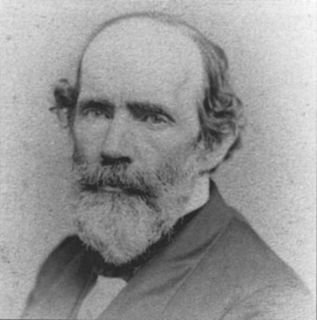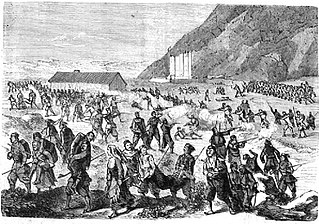
The Fifteenth Amendment to the United States Constitution prohibits the federal government and each state from denying a citizen the right to vote based on that citizen's "race, color, or previous condition of servitude." It was ratified on February 3, 1870, as the third and last of the Reconstruction Amendments.

Gabriel Charles Dante Rossetti, generally known as Dante Gabriel Rossetti, was an English poet, illustrator, painter and translator, and a member of the Rossetti family. He founded the Pre-Raphaelite Brotherhood in 1848 with William Holman Hunt and John Everett Millais. Rossetti was later to be the main inspiration for a second generation of artists and writers influenced by the movement, most notably William Morris and Edward Burne-Jones. His work also influenced the European Symbolists and was a major precursor of the Aesthetic movement.
The abolition of the han system in the Empire of Japan and its replacement by a system of prefectures in 1871 was the culmination of the Meiji Restoration begun in 1868, starting year of Meiji period. Under the reform, all daimyōs were required to return their authority to the Emperor Meiji and his house. The process was accomplished in several stages, resulting in a new centralized government of Meiji Japan and the replacement of the old feudal system with a new oligarchy.

John Cassin was an American ornithologist. A Pennsylvania Quaker and businessman, he took up an unpaid position as curator of the Philadelphia Academy of Natural Sciences and published several books, and described numerous species of bird.
119 is the natural number following 118 and preceding 120.
The Cincinnati Red Stockings of 1869 were baseball's first openly all-professional team, with ten salaried players. The Cincinnati Base Ball Club formed in 1866 and fielded competitive teams in the National Association of Base Ball Players (NABBP) 1867–1870, a time of a transition that ambitious Cincinnati, Ohio businessmen and English-born ballplayer Harry Wright shaped as much as anyone. Major League Baseball recognized those events officially by sponsoring a centennial of professional baseball in 1969.

One of the functions of the North German Confederation was to handle the mail and issue postage stamps, which it began doing, by means of the North German Postal Union (Norddeutscher Postbezirk), on 1 January 1868.

Elections to the United States House of Representatives were held in 1868 to elect Representatives to the 41st United States Congress. The election coincided with the presidential election of 1868, which was won by Ulysses S. Grant.

The Forty-first United States Congress was a meeting of the legislative branch of the United States federal government, consisting of the United States Senate and the United States House of Representatives. It met in Washington, D.C. from March 4, 1869, to March 4, 1871, during the first two years of Ulysses S. Grant's presidency. The apportionment of seats in the House of Representatives was based on the Eighth Census of the United States in 1860. Both chambers had a Republican majority.

The Great Seal of the State of Wyoming was adopted by the second legislature in 1893, and revised by the sixteenth legislature in 1921.
Laddville is a former settlement in the western Livermore Valley of Alameda County, California.
Taieri is a parliamentary electorate in the Otago region of New Zealand, initially from 1866 to 1911, and was later recreated during the 2019/20 electoral redistribution ahead of the 2020 election.

A cargo liner, also known as a passenger-cargo ship or passenger-cargoman, is a type of merchant ship which carries general cargo and often passengers. They became common just after the middle of the 19th century, and eventually gave way to container ships and other more specialized carriers in the latter half of the 20th century.
The United States Senate elections of 1868 and 1869 were elections which had the Republican Party maintain their majority in the United States Senate. However, six former Confederate states were also readmitted separately from the general election, each electing two Republicans. This increased the Republicans' already overwhelming majority to the largest proportion of seats ever controlled by the party.

Veliko Trebeljevo is a settlement in the hills east of the capital Ljubljana in central Slovenia. It belongs to the City Municipality of Ljubljana. It was part of the traditional region of Lower Carniola and is now included with the rest of the municipality in the Central Slovenia Statistical Region.

The Krivošije uprising of 1869 was an internal conflict in the far south of the Austro-Hungarian Empire that broke out following the Austro-Hungarian government's decision to extend military conscription to the tribe and region of Krivošije. It lasted from October 1869 until a formal peace accord was signed on 11 January 1870. The rebels managed to defeat the Austro-Hungarian army detachments sent against them and in the end the government conceded on all points of dispute.
Elections to Liverpool Town Council were held on Monday 1 November 1869. One third of the council seats were up for election, the term of office of each councillor being three years.
Elections to Liverpool Town Council were held on Monday 2 November 1868. One third of the council seats were up for election, the term of office of each councillor being three years.
The 1869–70 New South Wales colonial election was for 72 members representing 60 electoral districts. The election was conducted on the basis of a simple majority or first-past-the-post voting system. In this election there were 8 multi-member districts returning 20 members and 52 single member districts. In the multi-member districts each elector could vote for as many candidates as there were vacancies. 11 districts were uncontested.
This page is based on this
Wikipedia article Text is available under the
CC BY-SA 4.0 license; additional terms may apply.
Images, videos and audio are available under their respective licenses.









